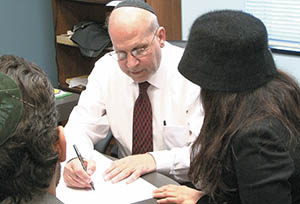
Englewood—It’s the lady in front of you in the carpool line; you know her to wave and say hi. It’s the family you pass when you’re leaving the doctor’s office, or the man helping his son climb into a swing at the Shabbos park. It’s a woman re-entering the workforce after 20 years at home. Or it’s even a neighbor who built a big house but (unbeknownst to you) lost his job.
It’s a typical local family. Say they have four children in yeshiva, and the wife works part time. The husband’s company downsizes, so he is faced with taking a lower salary, or none at all.
All of a sudden the ends don’t meet.
What do all these people have in common? One time or another, they have all called on Project Ezrah.
“We are there for a crisis,” said Robert Hoenig, Project Ezrah’s executive director, in a recent interview with the Jewish Link. “Any one of us can be sitting in shul on shabbos and without knowing, you can turn to your right or your left, looking forward or backwards, and your buddy, that you’ve been sitting next to for the past four or five months, could be having a nightmare of a life,” he said. “You don’t know it, because he’s not going to share it with you. And we certainly will never share that information with anyone, but he barely gets up every morning, it’s a huge effort, just to get up and do whatever it is that he’s doing. And he is in terrible pain. This is what we are about. That is what this organization is here to do. To help your neighbors; our neighbors,” Hoenig said.
“There is no shul in this community that doesn’t have at least a handful of Project Ezrah clients and job candidates,” said Susan Alpert, the organization’s development director.
Project Ezrah, which celebrates its 14th annual dinner on December 19, has 234 active candidates in their job and employment services program. “The dinner powers our ability to keep supporting our financial clients and employment candidates, help support new clients and expand our services in terms of new projects and programming,” said Alpert.
Hoenig discussed the delicate balance that the group’s employees face. “Here at Project Ezrah we are faced with a daily struggle of, on the one hand, taking care of many families in need, who are living nightmarish lives, and on the other hand we have an obligation to our community as a whole to take care of and manage the dollars entrusted to us, to help take care of the people who need this help. We are very careful with the community’s money, in terms of spending it wisely. We have limited resources and that’s the struggle that we experience every day,” he said.
Support gained from the community’s annual dinner funds programs that may perhaps prevent crises several years in advance. As part of a new program this year, the group is running special seminars for budget planning and financial coaching. “This is for young people, with maybe one child, who have not yet been hit by the tuition avalanche,” said Hoenig.
Last year, Ezrah also hosted seminars related to social media visibility and resume development, all of which were open to the larger community. The group also has launched a new website, with videos and job and career advancement advice, which aids clients in getting or staying up to speed. The site even features a page dedicated to Rabbi Yossie Stern z”l, Project Ezrah’s founder and longtime executive director, who passed away two years ago, and whose advice carries the organization forward.
And with so many new programs and advances, many clients are thankfully “graduating” from Project Ezrah. “But as they depart, we are backfilled by new families,” said Hoenig. Hoenig noted that since the economy is starting to look better, he has recently been asked if things have quieted down. But there have not been fewer calls. “Things are not okay here. This is our daily struggle. We have limited resources and the need continues to be great,” he said.
Each family who becomes a Project Ezrah client must comply with stringent rules, including having gone over their entire budget with a counselor. But, Hoenig and Alpert noted, they never say no to anyone with a legitimate, demonstrable need, and that’s where the dinner comes in.
This year, because of a strong interest from young members of the community to support Project Ezrah, there is a Young Leadership group forming to attend the dinner. Dara and Andrew Turk of Teaneck are leading the charge as Project Ezrah Young Leaders. The cost per couple for Young Leaders (under 35) is $180, while the general cost is $360.
Receiving the Rabbinic Leadership Award this year is Rabbi Steven Weil. The other honorees include Amy and Joshua Fogelman, Ellen and Richard Gertler, Emily and Eli Isak, Maren and Robbie Scharf and Rivka and Baruch Stein. This year, for a change of pace, a meat buffet will be served, and one or two sponsored “surprises” in terms of entertainment will be strolling the crowd. The dinner will be held at Englewood’s Congregation Ahavath Torah on December 19 at 8pm. Many may have already received their invitations, but to sign up for the dinner, visit www.ezrah.org or call 201-569-9047.
By Elizabeth Kratz









